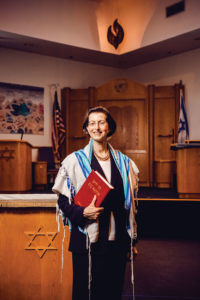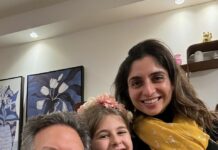Rabbi Susan Grossman traces the pivotal decision-making moments in her life to four interactions. Two helped swing her decision, in the middle of a successful career, to quit and go to rabbinical school. Two others set her on the path to leaving her first pulpit, and her New York home, to lead Beth Shalom Congregation in Columbia.
“God’s giving me a clear message,” she remembered. “This is the right place.”

Twenty-five years after finding “the right place” as the Conservative congregation’s first woman rabbi, Grossman is reflecting on her fulsome career of “firsts” and looking forward to a new journey as rabbi emerita and author.
With June 30 as her official retirement date, the congregation is mounting A Magical Musical Evening on June 12 to honor her. Congratulatory letters and expressions of thanks are pouring in, including from President Joe Biden and Shuly Rubin Schwartz, chancellor of the Jewish Theological Seminary, where Grossman was ordained in 1989.
“As one of the first women to be ordained by the Conservative Movement, you have been a true trailblazer, modelling for future generations what inspired female rabbinic leadership looks like,” Schwartz wrote. “Through your teaching, mentoring, and spiritual leadership, you have enriched your congregation immeasurably.”
At the intersection of politics and spirituality
Growing up in the Bronx, and later as a teen on Long Island, Grossman’s Jewish life was limited to marking only major holidays and rarely going to synagogue.
“It wasn’t even an idea for women to be rabbis and I didn’t grow up observant,” Grossman remembered. “I didn’t grow up with any Jewish education.”
But that all began to change when her interest in photography and journalism led her to a political journalism major at State University of New York (SUNY) Binghamton. An exchange program took her to San Francisco State and University of California, Berkeley in the 1970s — loci of the counterculture and antiwar movements.
“I became very interested in the intersection between political activism and spirituality in the ‘70s,” Grossman said. “Spirituality without political activism was insufficient, and vice versa.”
During that time, Grossman met Rabbi Shlomo Carlebach and Rabbi Zalman Schachter — changemakers in Judaism and spirituality.
“[They were] talking about a Judaism that I can relate to,” Grossman recalled. “A very different experience than when I grew up on Long Island.”
As she became more engaged in her Judaism, becoming a Jewish leader came naturally.
“I became active in the Jewish women’s movement with Blu Greenberg and Anita Diamant, Paula Hyman, Susan Schneider, all the people at the forefront,” she said. “I gained my Jewish skills — Hebrew, prayer and Jewish learning. And I started thinking … maybe the rabbinate is a good place for me.”
While working full time as a journalist and editor, she pursued her master’s in Bible and Talmud at Brooklyn College. There, Grossman decided being a scholar was the right road. She wanted to work in a Conservative setting, but the Conservative movement was not yet ordaining women.
“I believe in the historical importance of halachah, as the way that has always united the Jewish people, no matter our century or what lands we’re in. We didn’t have an independent land of our own, an independent nation of Israel, until 1948,” Grossman said. “But we were able to be a people because we had a law. So, law becomes, again, that intersection between politics and spirituality. It’s the way we walk on God’s path in the world. It’s the way that we function together, united as a people, with all of our differences.
Of course, there’s a lot of flexibility in the law, and there’s a lot of difference of opinion, which is a great thing in Judaism. But we have a constitution, we have a precedent law. We have what nation-states have. That was important to me.”
Holy sparks
And then it was 1983, and the Jewish Theological Seminary voted to accept women.
Grossman had been married since 1980 to her husband David, and they wanted children.
With a successful career in Jewish journalism, and as head of Holocaust programming for the National Jewish Resource Center (later CLAL), she was unsure of making a major move.
“Do I want to go back to six years of school? It was a very hard decision,” Grossman remembered. “I wanted to be a rabbi, but I had a family to support. I had to think. And I got two phone calls.”
The first was from a community member asking her to speak at a rally following civil unrest in Brooklyn. But without a position in the Jewish community, she didn’t feel justified in speaking.
“But if I were a rabbi, I would be authorized to represent the Jewish community,” she thought. “So that was step one.”
Step two? A call about a complicated Passover question. Grossman said she’d call her rabbi. “Call your rabbi?” the caller asked. “You’re my rabbi!”
“I guess I’m going to rabbinical school!” Grossman recalled thinking.
“If people are looking to me as a rabbi, then I better know what I’m talking about,” Grossman continued. “So that was it. God sent me two very unambiguous messages that reflected both of my passions. That sense of both the spiritual and the political together, doing good in the world for the Jewish community and through halachah.”
Being a woman rabbi in a world largely absent of them, Grossman faced challenges. But she entered rabbinical school and then her first appointment as a pulpit rabbi after years of social and spiritual activism, of growth as a feminist and leader, while behind her stood a role-model mother who used to swat roving hands with a wooden ruler when she worked as a secretary.
“It was important not to be reactive or defensive, and to have a thick skin and have a sense of humor,” Grossman said.
Straight out of rabbinical school, Grossman became the first woman rabbi to lead Genesis Agudas Achim Congregation in Tuckahoe, N.Y. During her eight years there, in 1992, she was appointed to the Rabbinical Assembly’s Committee on Jewish Law and Standards, one of the first and only women. Serving the Conservative institution for three decades, she wrote many influential rabbinic decisions. Also in 1992, she co-edited “Daughters of the King: Women and the Synagogue.”
When it was time to move on from her first pulpit, Grossman looked close to home in New York, but then a couple of things swayed her.
The first was an aunt living in Columbia, urging her to move down. Then, at a rabbinical conference, she saw Rabbi Noah Golinkin and Rabbi Kenneth Cohen — Beth Shalom’s first two leaders.
“They said, ‘We have this great shul for you. You should apply. In Columbia, Md.,’” Grossman said. “Again, it was two messages. God’s giving me a clear message. This is the right place.”
And it was. When she and her family arrived at Beth Shalom to meet leadership and the congregation, Grossman felt an instant connection and comfort from the kindness shown.
But relocating wasn’t easy. Her husband, in the food industry, had to adapt his business, and their son Yoni had to start over at a new school.
Making a difference for the future
Grossman brought to Beth Shalom what she had been advocating for much of her life: a deep respect for Jewish law, equality and respect for everyone and a focus on women’s importance in Judaism, while making lasting interfaith/intercultural/interracial connections.
Serving on numerous boards and commissions throughout the community and the region, she received many honors.
Meeting with international leaders and accepting invitations from the White House didn’t distract from Grossman’s synagogue mission of nurturing adults, and especially children, with an education in Judaism that was meaningful, fun and long-lasting.
Howard Fishbein served the synagogue as executive vice president, president and long-range planner. His family joined Beth Shalom 25 years ago, just after Grossman arrived. Their decision rested on that focus on children — their first daughter Eliza was a second-grader at the time.
“We had a choice [of shuls]. We met Rabbi Grossman and she was so engaging, so kind and sweet,” Fishbein said. “When we asked Eliza what she thought about the rabbi, she said, ‘She’s great. I love her.’ That was it, exactly the kind of enthusiasm we wanted. We became members because of her and the way she nurtured the kids.”
Upon her arrival, Grossman also envisioned a comprehensive adult education program. Tammy Lawrence, a member who joined in 1995, became the first education chair and is now personnel chair and immediate past president.
“It started off with us seeing a need, offering programs and putting them into play,” Lawrence said. “We had an introductory Hebrew class, from Rabbi Golinkin. There was a need for more, and Rabbi Grossman loves teaching. She would teach fall and spring semesters. It was a collaborative relationship.”
Seeing a woman on the bimah was a new experience for congregants, and especially impactful for some women.
“She brought a lot of spirituality with her. It showed in everything she did and was a motivator,” Lawrence said. “I started wearing a tallit at Beth Shalom, and she was an influence for that.”
Grossman said she was particularly proud of the period when the synagogue had all-female leadership: a woman rabbi, cantor and president.
The current cantor, Rebecca Apt, has been singing with Grossman and the congregation since 2018 and has many fond memories.
“I sing with her all the time, but Purim is especially fun,” Apt said. “Working with her on Purim and all of her different costumes, and singing the different songs with her, has that extra lightheartedness.”
Apt also credits Grossman for not only addressing interfaith issues in the community, but also within the synagogue.
“I was very impressed with how many ways, interfaith parents especially, are able to be incorporated and involved in the b’nai mitzvah program and in the religious school, and interfaith families who don’t have kids in the school,” Apt said. “I’ve been impressed with how inclusive she is. And her consistency is one of the reasons she’s been so successful in being such a big part of the community.”
Lawrence looks back on Grossman’s 25 years and sees the many qualities, the many reasons, she is a beloved and respected rabbi and why she will be sorely missed.
“She gives dynamic sermons. She is an excellent teacher. If anyone needs anything, she’s there for them,” Lawrence said. “She is excellent in crises. If somebody has a death or medical emergency, she’s there. She really cares about the congregation. She considers the congregation her home — and she made it her home.”
Susan C. Ingram is a Baltimore-based freelance writer.







I went to school with Sue here in Levittown and would like to attend the Zoom event
Please advise.
TIA